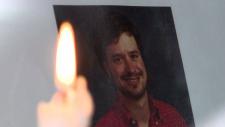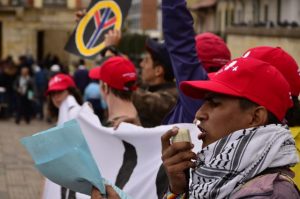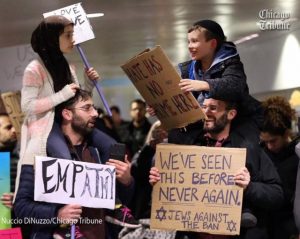Pacifism and the Soldier–Part 4
![]()
Warriors for Peace
This month, we have looked at pacifism, soldiers, and conscientious objectors. Hopefully, the posts have honored everyone’s service to society, with a sense of feet-on-the-ground reality. I’d like to finish this contemplation by naming organizations that work for peace.
The second post I did for this blog (3/15/18) began with remembering Michael J. Sharp who was killed last year by rebels in the Democratic Republic of Congo. M.J. Sharp worked for Mennonite Central Committee and then for the U.N. trying to bring rebel soldiers to reconciliation. By accounts, he was brave, determined, and kind. He exemplified courage and humility: he was a warrior for peace.
Links: https://mcc.org/stories/mourning-death-michael-j-sharp

M.J. Sharp, CPT file
____________
Christian Peacemaker Teams—Building partnerships to transform violence and oppression.
If you click on the link above, you can see an excellent video on the Home page about CPT’s mission.
In the video, Carol Rose, assistant director says, ‘CPT started with a vision that if the church—which is committed to nonviolently following Jesus and to action for peace in the world, stepped up to that task with the same kind of commitment, the same willingness to risk, that other parts of society do when they are making war—that that could bring change that could put an end to war perhaps. At least it could make a big dent out of the war making machine. What would it look like if tens of thousands, hundreds of thousands of Christians, non- violent, got in the way of war?’
I would gladly add ‘non-Christians’ to the hundreds of thousands who wish to make change.
CPT’ers serve throughout the world wherever there is injustice and imbalance of power. They listen, record, and support those who nonviolently work for change in their own countries. They have been known to plant themselves in front of soldiers and tanks, preventing them from firing on crowds or mowing down buildings.

CPT file
At our recent Central District Conference’s annual meeting, prayers were asked for a CPT member who is awaiting sentencing after he and a group of Indigenous peoples were arrested by aggressive soldiers in flak jackets, driving Humvees. The soldiers suddenly roared over an incline and arrested the pipeline protestors who were simply standing around their tents. This happened in our own country.
Below is a list from the CPT website on its mission, vision, and values:
‘CPT’s Mission
Christian Peacemaker Teams: Building partnerships to transform violence and oppression.
Vision
A world of communities that together embrace the diversity of the human family and live justly and peaceably with all creation.
Values
Christian Peacemaker Teams is committed to work and relationships that:
- Honor and reflect the presence of faith and spirituality
- Strengthen grassroots initiatives
- Transform structures of domination and oppression
- Embody creative non-violence and liberating love
In my thinking, CPTers are warriors for peace. I apologize if ‘warrior’ and ‘peace’ together seem to negate each another’s meaning. I find myself saying ‘warrior’ because the sense of camaraderie, courage, and intelligence it takes to be nonviolent is comparable to that experienced by soldiers. As we have examined, nonviolence takes guts as well as wisdom. The difference is humility and obedience to the call of peaceful interaction.
____________
An organization that works with conscientious objectors is the Center on Conscience & War. Below is information quoted from their website. The website contains a wealth of information and resources, not only for COs but for those contemplating whether to go into the military or try to find civilian work.
‘CCW is a non-profit organization that advocates for the rights of conscience, opposes military conscription, and serves all conscientious objectors to war.’
‘The Center on Conscience & War (CCW) works to extend and defend the rights of conscientious objectors (COs), those who oppose their participation in war, including members of the US military who, following a crisis of conscience, seek discharge as conscientious objectors. CCW also assists others who oppose their participation in war and the preparation for war, including youth required to register with Selective Service; individuals seeking US Citizenship who wish to take the alternative, nonviolent oath; and citizens of other countries facing mandatory military service. CCW opposes conscription, and, in the event of an active military draft, CCW will assist in the placement of conscientious objectors in alternative service programs, as we did in previous draft years.
CCW, formerly the National Interreligious Service Board for Conscientious Objectors (NISBCO), founded in 1940, is a founding member of the G.I. Rights Hotline, a national referral and counseling service for military personnel.
All services are provided free of charge.‘
____________
Several Sundays ago, Austin Kocher, a pacifist who in another life was a soldier, spoke to our church about pacifism and activism. To him, they come together. In his article for The Mennonite magazine (an important read,) Kocher tells about his reasons for joining the military, which at age seventeen included getting out of Ohio and being supported in the decision by his evangelical faith’s acceptance of such service. He was a gung-ho soldier, being accepted into SEAL training. When he left that training, he was assigned to Puerto Rico, where he ‘worked as a Law Enforcement Specialist at a time when the anti-globalization movement was at its height, and the base, Roosevelt Roads, faced sustained anti-military protest,’ he writes. Years later, when he integrated the U.S. violent response to 911 and his personal relationships with immigrants, he began a journey toward pacifism. In a Mennonite church, he met ‘CPTers who were activated for anti-military protests in Puerto Rico during the same time that I was stationed there.’ He reconciled his memories of the military to his new understanding of the Mennonites role of peacemaker. Kocher is clear that becoming a pacifist was not easy. He works to accept all parts of who he is, and who he was. The change, as all changes do, involved ‘the loss of friendships and changes in career.’ He is now a PhD graduate who ‘focuses on immigrant rights, legal geography, and alternatives to police and military violence.’
____________
Mennonite Men is ‘the men’s organization for Mennonite Church Canada and Mennonite Church USA with a mission of Engaging men to grow, give, and serve as followers of Jesus.’ To me, a Mennonite woman, its importance cannot be overstated. I am a feminist, and thus, I don’t need or want men to lead me or ‘mansplain’ everything to me. But as a Mennonite who grew up with boys who had to make men’s decisions early in life, and who had to be peacemakers from an early age—a huge burden, as we have seen in recent posts—I have a protective feeling about our men. I admire their carrying of this burden. At a conference meeting last weekend, the men heard from their new U. S. coordinator Steve Thomas who is co-founder of Peacemakers Academy, a martial arts program(!!) for kids where self-esteem and respect for others is learned. ‘We teach positive alternatives to violence with training that integrates conflict transformation and martial arts skills.’ Mennonite Men contribute to their communities and study such things as: ‘Making Peace with Conflict,’ ‘Healthy Masculinity’ (as opposed to toxic masculinity,) and ‘Doing Business: Integrating Work and Faith.’
____________
Recently, David Brooks wrote an OpEd for the NYTimes (Donald Trump’s Magical Fantasy World) in which he examines the fantasy of American masculinity from the fictional Jay Gatsby through the very real John Wayne and Hugh Hefner, to today’s political world. Women have immense power and work ethics. They can move mountains. But if they must work against men to move those mountains, they can tire. All of us are in better shape when soldiers, pacifists, and those who don’t even think about these things respect each other’s unique gifts and work together for our children. The unremitting march of time makes our time on this earth a finite moment. It is the kids who will inherit the earth. We must teach them strength in cooperation now. We can teach more of them to be warriors for peace.

CPT file
__________
I welcome your comments: gretaholtwriter.com/blog. Please enjoy a few short stories on the Home page, as well.
{Thank you to my niece, Addie Liechty, for taking the picture above that is this blog’s featured image. Her blog is: https://addieswriting.wordpress.com.}
Best wishes and have a good week.
Greta
What a great summary of peace-building organizations, Greta! I especially appreciated your reflections about what Austin Kocher shared at our congregation about a month ago, bringing back some good memories about how moved I was by his talk. What a gift he is to have him among us here in Ohio. Steve Thomas is a good friend – he’ll be great at leading Mennonite Men which indeed does model “healthy masculinity” within our denomination. And I loved what you shared in the context of CPT, but applicable to all levels of our lives: “As we have examined, nonviolence takes guts as well as wisdom. The difference is humility and obedience to the call of peaceful interaction.”
Thank you for a lovely response, Clair. Yes, we Mennonites do have good resources for peace and justice.